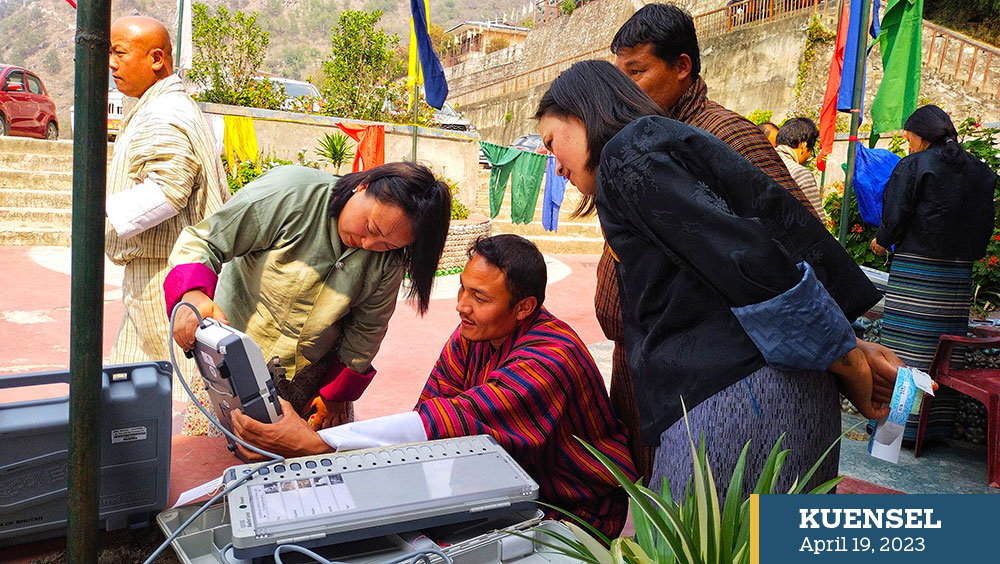Voters across Bhutan will decide the fate of the 89 National Council candidates in 20 dzongkhags tomorrow.
Many from Thimphu are moving to their homes in the dzongkhags to vote.
Voting at the polling stations will begin at 8am and end at 5pm. All voters have to carry their valid Citizenship Identity Card or Voter Photo Identity Card (VPIC) to the polling station.
The Election Commission of Bhutan has declared tomorrow as a public holiday so all offices, schools, educational institutes, shops, and businesses in the 20 dzongkhags will remain closed.
The election has entered the two-day no-campaign period from 8am yesterday until the closure of the polls tomorrow. During this period, no one is allowed to publish, broadcast, or transmit any material that is in the nature of election campaign, supporting or opposing any candidate in any media platform. However, ECB says, the authorised campaign materials pasted during the campaign period may be retained as it is if they are not within 100 meters of a polling station.
Most dzongkhags have deployed polling officials and polling stations in the dzongkhags have been set up. Returning Officers are receiving postal ballots and opening of the envelope A will begin today in larger dzongkhags.
Dagana sees gradual increase in registered voters
Choki Wangmo
Compared with the 2018 National Council (NC) elections, Dagana Dzongkhag has recorded an increase in the number of registered voters and postal voters this time.
Records with election officials show that the number of registered voters this year rose to 27,601—13,819 female and 13,782 males— an increase of 3,031 from 24,570 in 2018.
Dagana is among the top five dzongkhags that saw an increased number of voters. Trashigang had an increase of 4,565, 4,474 in Samtse, and 3,568 in Mongar, followed by Dagana.
However, locals say that due to the lack of postal ballot facilities, the voter turnout might drop.
A resident of Sham Dolay, Tshoju, has 11 eligible voters in his family. But only three of them would be casting their votes this election. “Not many living in other towns can afford to come here. They need time and money.”
But some eligible voters living in other dzongkhags have started arriving in groups recently.
“Many families hired buses to come to the village and vote. It is encouraging,” another resident said.
The voter turnout in the dzongkhag in the last NC election was 13,957. The postal voters increased to 5,448 in the dzongkhag—5,427 from within the country and 21 from abroad. In the last NC elections, the dzongkhag received 3,491 postal votes.
The voters will cast their votes at 44 polling stations within the dzongkhag on April 20. A total of 132 polling officers, 44 presiding officials, and 176 security personnel from Royal Bhutan Army, Royal Bhutan Police, and de-suups are deployed across the dzongkhag on election duty.
The officials underwent a refresher course on how to operate the EVM, management of the polling station and handle electoral materials yesterday.
There are 485,811 registered voters—249,071 females and 236,740 males— in the country of which 105,704 are postal voters.
Postal Ballot returns in Lhuentse’s National Council Election
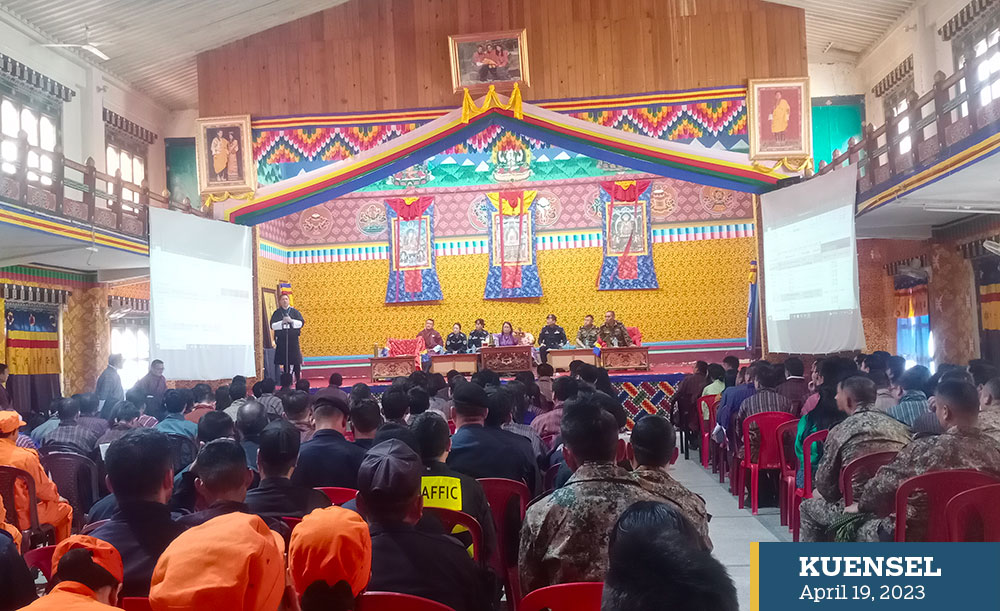
Thinley Namgay
Lhuentse’s returning officer (RO) has received 4,606 ballots out of the 5,092 registered for the postal ballot in the upcoming National Council (NC) election.
The remaining 486 ballots are expected to arrive before the polling day.
Lhuentse has eight gewogs with 18,479 eligible voters; a total of 217 officials will be involved in this year’s NC election.
Lekjey, Lhuentse’s RO, said that seven officials were deployed to Tshang-Ngo polling station in Khoma Gewog on April 17. Additional 210 officials will arrive at their respective stations before noon today.
He said that preparations are on track and expects a successful election. The dzongkhag has 30 polling stations, and some vehicles have been arranged for challenging stations.
Yesterday, Lhuentse’s election officials and other relevant stakeholders conducted a day-long refresher course at Lhuentse HSS for polling officials, presiding officials, and security personnel in preparation for the NC election.
Officials were briefed on roles and responsibilities, code of conduct, use of electronic voting machines and transportation, among others.
Despite preparations, residents and participants of the refresher course expressed concerns about the road conditions.
Lhuentse Dzongdag Jigme Choden also attended the refresher programme.
Paro RO receives over 90 percent postal ballots as of yesterday
Thukten Zangpo
The Office of Returning Officer in Paro received 2,375 postal ballots—2,363 from in-country and 12 from overseas for the National Council election as of yesterday.
The Office received a request for 2,634 postal ballots from in-country and 62 from overseas.
“The Office will accept postal ballots until 5pm today,” the Returning Officer, Karma Wangdi said, adding that counting will begin today.
After the Office of Returning Officer held a refresher course for the first batch of officials on April 17, the batch of 12 officials and 12 security personnel left for the three farthest polling stations in Nubri, Yagsa and Tsendegang yesterday.
The second batch of 181 officials including security personnel of the remaining 26 polling stations was provided refresher courses at Dogar Gewog administration yesterday.
The officials were briefed on their roles and responsibilities, polling stations, and dos and don’ts, among others.
He said that the office will ensure that all the remaining officials will be deployed to their polling stations by lunch today.
A team of four- dzongdag, dzongrab, dzongkhag electoral officer, and the returning officer will monitor the polling stations after lunch today, Karma Wangdi added.
Of the 10 gewogs in Paro, Naja gewog has the most polling stations of seven. There are no polling stations in Hungrel Gewog but eligible voters of the gewog can vote at polling stations in Shari HSS.
Five aspiring candidates are contesting for the NC in Paro. Jigme, 40 a former senior divisional manager with Bhutan Power Corporation was nominated by Sharpa Gewog.
A former chief forestry officer with the Ministry of Agriculture and Forests, 56-year-old Gyeltshen Dukpa will contest from Lung-nyi Gewog.
Wangchang Gewog has nominated 43-year-old contractor, Ugyen Dorji. Chief Trade Officer under the Department of Trade, Zecko, 53 was nominated from Dokar gewog.
Incumbent Ugyen Tshering, 53, will contest from Lamgong Gewog.
Out of the 10 gewogs in Paro, there were no nominees from five gewogs, namely Doteng, Dopshari, Hungrel, Naja, Tsento, and Paro Throm.
There are 20,876 eligible voters in Paro: 9,939 males and 10,937 females.
Punakha is prepared for NC election day
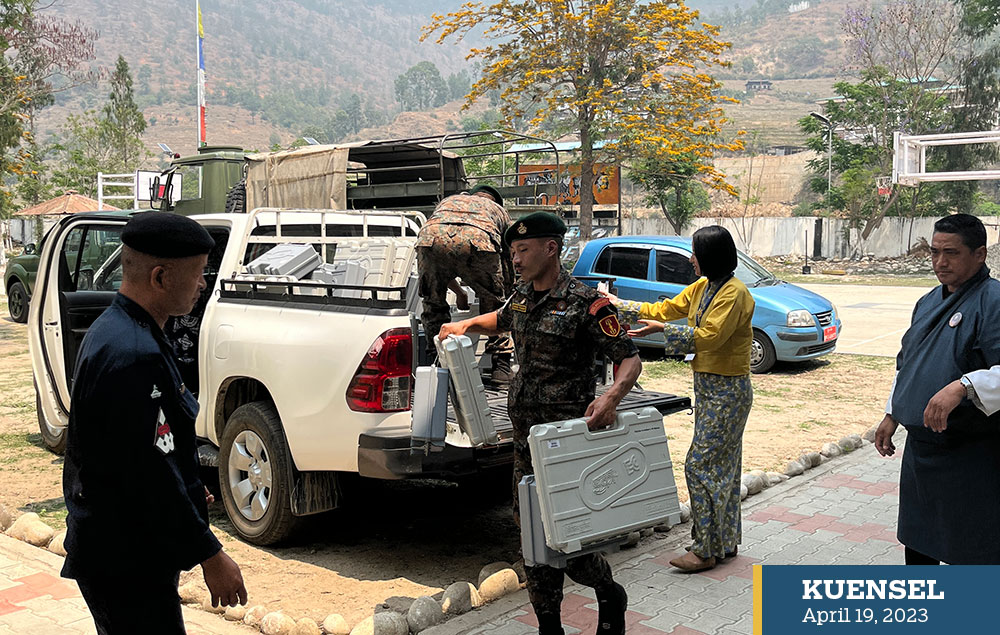
Four polling officials are deployed at each station
Chencho Dema
With all polling stations located near, polling officials deputed for the National Council elections poll day in Punakha will leave today.
Punakha RO Ugyen Dorji said, “The deployment is being done a day before the election because the polling stations are all close to each other; otherwise, it could have been done a few days earlier.”
He said the office was prepared for election day.
They attended a one-day refresher course at the Technical Training Institute hall in Khuruthang in Punakha yesterday.
The Office of the Returning Officer opened Envelope A of the postal ballot on the evening of April 18 and Envelope B will be opened on the morning of April 20.
As of April 17, only five of the 40 postal ballots sent abroad have been received.
The Punakha election office has received 3,362 postal ballots (in-country) as of April 17, while the office is still waiting for the remaining ballots.
The ballots must reach the RO office by April 19 at 5pm.
Punakha has 27 polling stations. In 2018 NC election, there were 30 polling stations.
A total of 86 security personnel, including three officers from the Royal Bhutan Police, two officers from the Royal Bhutan Army, and de-suups, would be stationed.
There are 18,788 registered voters for the NC election this year while in 2018, there were 16,949. Of the 18,788 registered voters, 9,852 are female and 8,936 are male.
Punakha has five candidates.
Chencho Wangdi, 48, from Sewla village has 21 years of work experience as a public servant, and was nominated from Chubu gewog with 423 votes in favour and 41 votes against him. He has a Bachelor’s in Secondary Education from Samtse College of Education.
Dophu Drukpa, 54, from Menchuna village was nominated from Toebisa gewog with 379 votes while his opponent got 317 votes at the dhamngoi zomdu. He has a bachelor’s degree in Agriculture Economics from University of the Philippines and a master’s from Chiang Mai University in Agriculture. He was a former PDP Member of Parliament in National Assembly.
Dorji Tenzin, 41, from Gangkha village is contesting from Shenga Bjemi gewog. He secured 281 Yes votes and 64 No votes. He graduated from Institute of Language and Culture Studies, Simtokha with a Bachelor’s in Language and Culture and was in service for 15 years.
Lhaki Dolma, 44-year-old from Bjimithang village, the incumbent NC MP, and the lone female candidate is the NC candidate from Dzomi Gewog. She got 321 Yes votes against 42 Nos to secure her nomination. She holds a Bachelor’s Degree in Language and Cultural Studies and a Post Graduate Degree from the Royal Institute of Management (RIM) in Development Management.
Namgay Dorji, 41, of Yoengu village in Talo Gewog beat another aspiring candidate by securing 282 votes. His opponent Tshewang Rinzin from Talo village secured 163 votes. This is his third time participating in the NC election. He graduated from Punjab University with Bachelors in Public Administration and a Master in Mass Communication and Media Management from Punjab Technical University.
Barp, Goenshari, Guma, Kabisa, Lingmukha, Toewang Gewogs, and the Khuruthang Throm did not have NC nominees.
Samtse aims for highest voter turnout
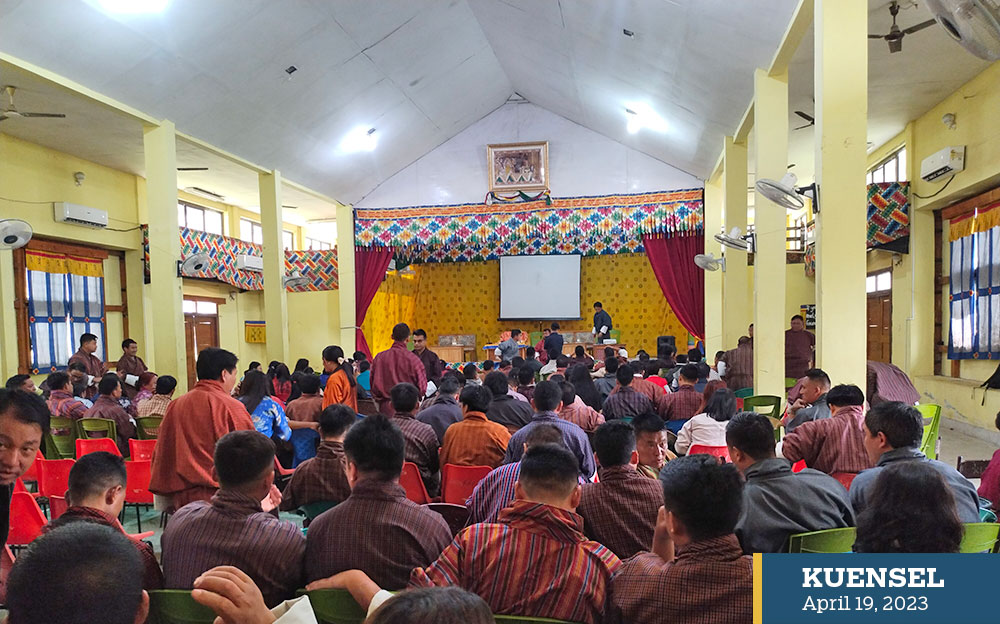
YK Poudel
Samtse dzongkhag deployed 274 polling officials after two days of refreshers course at Samtse HSS which ended yesterday.
The first batch of trainees was from 10 polling stations from distant stations who were deployed on April 18. The second batch of officials for 55 polling stations will be deployed today.
The Office of the Returning Officer issued a total of 6,851 postal ballots of which the office received 6,351 as of yesterday.
Samtse Dzongdag, Passang Dorji highlighted the target of achieving the highest voter turnout with no disputes in the NC elections. “With a greater number of informed voters, it is crucial that we assist in bringing perceptive representatives for the people.”
According to the RO, Karma, the course is important to prepare the officials to ensure they know the procedures, the duty and responsibilities.
“The polling officials were briefed and practically taught through mock polls, station layout, the entry and exit formations, submission of results to officials, assisting the people with disabilities and the standard procedures,” he said.
National Observer, Chencho Tshering talked about the requirements of the voters and the procedures. A voter must be legally 18 years and above, must be listed on the e-roll, and should produce Voter Photo Identity Card or Citizenship Identity card, among others.
Samtse dzongkhag has 51,834 eligible voters. There are 6,851 postal voters including 39 from overseas.
NC election in Thimphu
KP Sharma
More than 100 polling officials and nearly 90 security personnel are set to be deployed to 27 polling stations in Thimphu for the 2023 National Council (NC) election.
Thimphu has 16,429 eligible voters, comprising 7,704 males and 8,725 females, marking a 2,022 increase from the previous election in 2018.
Of these, 1,995 voters have requested for a postal ballot facility – 1,647 ballots were received as of April 17.
Election officials conducted a refresher course in preparation for the election, in which officials were briefed on the roles and responsibilities of different officials, code of conduct, and using electronic voting machines (EVMs).
The first group of officials travelled to far-flung polling stations in Lingzhi and Soe gewogs on April 17. The second group completed their course yesterday and would be leaving for their respective polling stations today.
Loselling polling station in Thimphu Thromde has the highest number of registered voters and Loodrachen polling station in Dagala Gewog have the lowest.
Thimphu has two NC candidates.
Trashigang and Trashiyangtse prepare for poll day
Neten Dorji
As the fourth National Council election approaches, Trashigang and Trashiyangtse are preparing for the poll day.
With the electronic voting machines (EVM) checked and sealed, 284 polling officials and security personnel will leave to set up for the poll day tomorrow.
They have been briefed on roles and responsibilities, code of conduct, and the use of EVMs.
Trashigang deployed eight polling officials at two polling stations of Merak gewog since April 15. Khiliphoo and Khashateng polling stations of Merak are the furthest polling stations in Trashigang.
The officials were sent and trained four days ahead of time.
Trashigang has one of the highest numbers of polling stations in the country.
Meanwhile, in Trashiyangtse, 141 polling officials, including returning officers and observers, are busy making rounds of the polling stations to ensure everything is ready before the big day.
Trashiyangtse has 20,586 registered voters spread across 36 polling stations.
The voters can vote at the polling stations from 8am to 5pm tomorrow.
Trongsa all set for poll day

Nima Wangdi
The office of the returning officer in Trongsa is ready for National Council (NC) poll day fast approaching on April 20.
The office has provided the polling officials with a refresher course on the election code and conduct, election procedure, how to relay election results, and to handle electronic voting machines (EVMs).
According to returning officer, Chorten Gyeltshen, all the polling officials would be dispatched to their respective polling stations today. Korphu is the farthest polling station, located approximately 75 kilometres away from Trongsa’s dzongkhag administration centre.
Each polling station will have a presiding officer, three polling officers, and security personnel. To ensure a smooth and hassle-free voting process, all EVMs have been checked, tested, and sealed, with two sets each being dispatched in case of malfunction or breakdown.
Trongsa has 20 polling stations.
As of April 17, the office of the returning officer had received 2,128 postal ballots of the 2,298 that were dispatched.
Meanwhile, Bumthang has also conducted a refresher course for polling officials. Bumthang has 18 polling stations.
The two dzongkhags have two candidates each.
Wangdue’s polling officials ready for elections
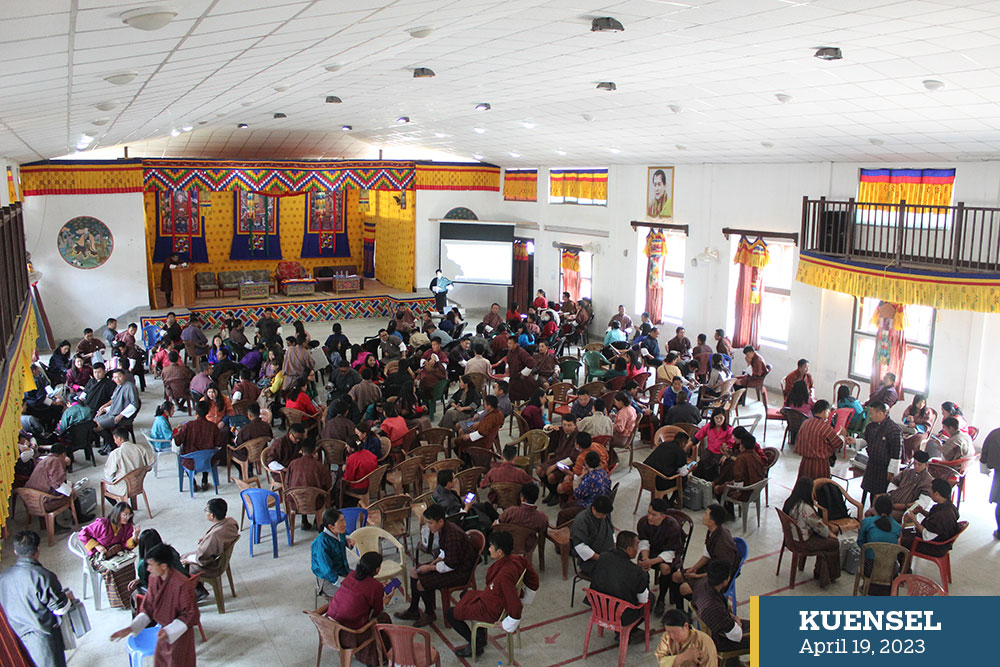
The refresher course in Wangdue ended yesterday
Jigmi Wangdi
The polling officers of Wangdue dzongkhag are all set to shoulder their duty at the polling stations tomorrow.
They attended a refresher course before leaving for their polling stations.
The polling officials were instructed on the importance of maintaining professional standards at the polling stations. This is to ensure the provision of quality services without causing inconveniences to the voters.
The polling officers were also briefed on the regulations that they have to follow including the Dos and Don’ts at the polling station. They were instructed to avoid making any statistical errors with the results.
The polling officials were also given a practical lesson on the use of electronic voting machines.
There are a total of 180 polling officials deployed on election duty in Wangdue. Four polling officers along with security personnel from RBP and RBA will be posted at each of the 45 polling stations within the dzongkhag.
Wangdue has a total of 22,370 eligible voters out of which 10.240 are male and 12,130 are female voters.
The dzongkhag has seen an increase in the number of voters this year by 2,286. In 201,8, it had 20,084 voters.


